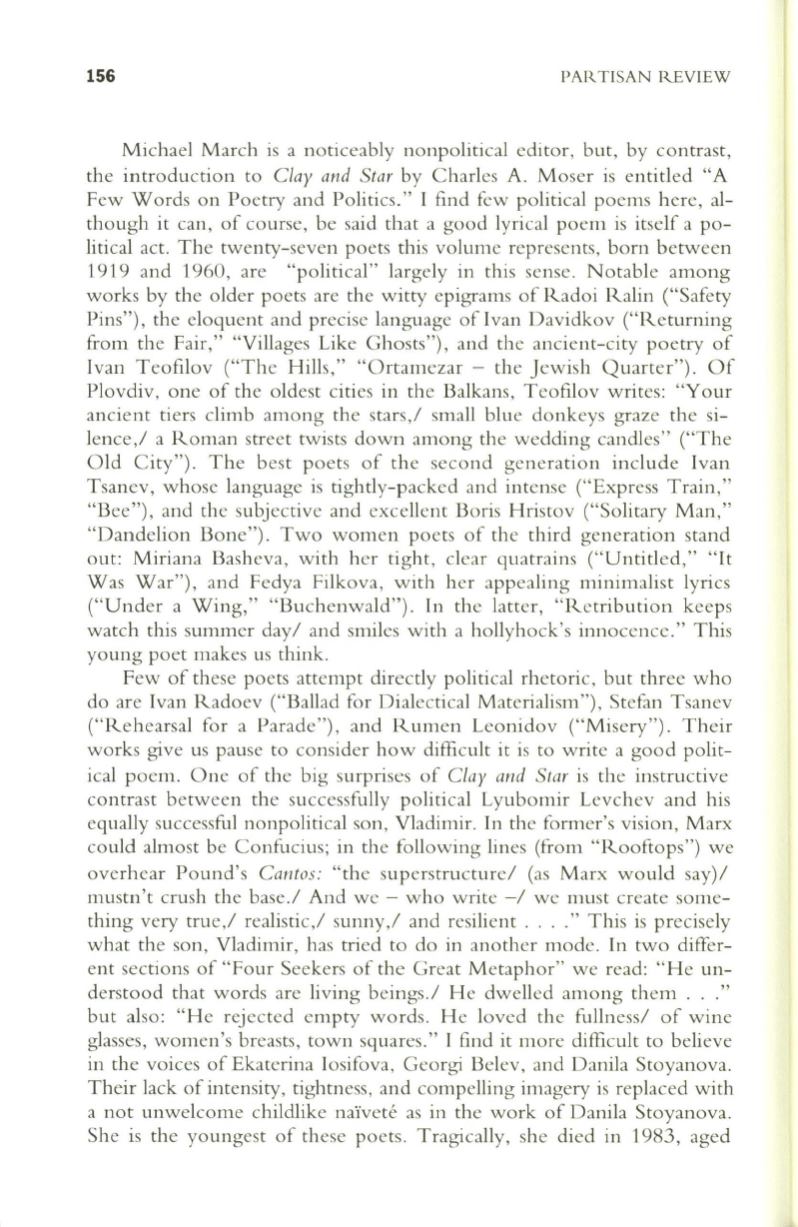
156
PARTISAN REVIEW
Michael March is a noticeably nonpolitical editor, but, by contrast,
the introduction to
Clay and Star
by Charles A. Moser is entitled "A
Few Words on Poetry and Politics." I find few political poems here, al–
though it can, of course, be said that a good lyrical poem is itself a po–
litical act. The twenty-seven poets this volume represents, born between
1919 and 1960, are "political" largely in this sense. Notable among
works by the older poets are the witty epigrams of Radoi Ralin ("Safety
Pins"), the eloquent and precise language of Ivan Davidkov ("Returning
from the Fair," "Villages Like Ghosts"), and the ancient-city poetry of
Ivan Teofilov ("The Hills," "Ortamezar - the Jewish Quarter"). Of
Plovdiv, one of the oldest cities in the Balkans, Teofilov writes: "Your
ancient tiers climb among the stars,! small blue donkeys graze the si–
lence,! a Roman street twists down among the wedding candles" ("The
Old City"). The best poets of the second generation include Ivan
Tsanev, whose language is tightly-packed and intense ("Express Train,"
"Bee"), and the subjective and excellent Boris Hristov ("Solitary Man,"
"Dandelion Bone"). Two women poets of the third generation stand
out: Miriana Basheva, with her tight, clear quatrains ("Untitled," "It
Was War"), and Fedya Filkova, with her appealing minimalist lyrics
("Under a Wing," "Buchenwald").
In
the latter, "Retribution keeps
watch this summer day/ and smiles with a hollyhock's innocence." This
young poet makes us think.
Few of these poets attempt directly political rhetoric, but three who
do are Ivan Radoev ("Ballad for Dialectical Materialism"), Stefan Tsanev
("Rehearsal for a Parade"), and Rumen Leonidov ("Misery"). Their
works give us pause to consider how difficult it is to write a good polit–
ical poem. One of the big surprises of
Clay and Star
is the instructive
contrast between the successfully political Lyubomir Levchev and his
equally successful nonpolitical son, Vladimir.
In
the former's vision, Marx
could almost be Confucius; in the following lines (from "Rooftops") we
overhear Pound's
Cantos:
"the superstructure/ (as Marx would say)/
mustn't crush the base.! And we - who write -/ we must create some–
thing very true,! realistic,! sunny,! and resilient .... " This is precisely
what the son, Vladimir, has tried to do in another mode.
In
two differ–
ent sections of "Four Seekers of the Great Metaphor" we read: "He un–
derstood that words are living beings.! He dwelled among them ... "
but also: "He rejected empty words. He loved the fullness/ of wine
glasses, women's breasts, town squares." I find it more difficult to believe
in the voices of Ekaterina losifova, Georgi Belev, and Danila Stoyanova.
Their lack of intensity, tightness, and compelling imagery is replaced with
a not unwelcome childlike naIvete as in the work of Danila Stoyanova.
She is the youngest of these poets. Tragically, she died in 1983, aged


